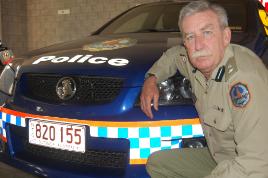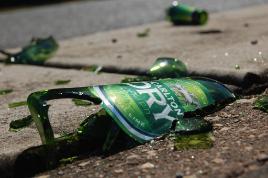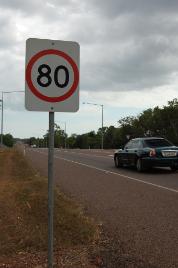Police call for ideas to reduce road toll
Published on 20 August, 2008
Northern Territory police are calling on young people for ideas to reduce a rising road toll.
So far 37 people have died on Territory roads this year - more than the entire annual road toll of 2004 - while at this time last year just 23 people had died in vehicle accidents.
By student reporter Cameron Jackson

The "Reaching Generation Y" campaign located at http://www.pfes.nt.gov.au/ asks for any comments or ideas to emphasise to young Territorians the importance of abiding by road safety laws and regulations.
In the most recent crash a female tourist died and her two passengers were critically injured when their hire car rolled about 90km from Jabiru.
In a separate accident a young woman was killed when her Ford Festiva slammed into a pole on the Stuart Highway.
NT Police Road Safety Superintendant Bob Rennie said it is a grave concern to police.
"These accidents could be avoided if people take more care on the roads.
"Over the last few weeks there's been a lot of tourist accidents happening, so I don't know how you can get that message across," said Superintendant Rennie.

He said NT Police had received over 100 responses from the website's campaign - mostly from young drivers but also from pedestrians and other non-drivers.
The majority of responses had been very constructive including greater driver education and improvements to an insufficient public transport.
"People say they have to wait too long for a taxi and, rather than risking a violent brawl in the city they take their chances driving home drunk," said Superintendant Rennie.
NT Minister for Transport Delia Lawrie recently announced that repeat drink drivers would have to install alcohol ignition locks in their cars in order to get their licence back.
She said the new system is part of a package by the NT Government to save lives on our roads.
"Last year alcohol was a factor in 35% of the tragic deaths on our roads - this is far too high.
"Repeat drink drivers risk their lives and others every time they get behind the wheel - but the ignition lock won't allow the car to start if the driver is drunk," Ms Lawrie said.

The Leader of the opposition Terry Mills agrees with the measures but said the government should go further to "the ultimate sanction".
"A repeat high level drink driver needs to have their vehicle confiscated.
"We need to focus more on changing the behaviour of drink drivers through strong, clearly focused measures," said Mr Mills.
Two years ago the NT Government introduced speed limits on the previously limitless Territory highways, claiming that it would reduce the amount of deaths on the roads.
A local organisation called ‘Keep NT Limit Free' was formed almost instantly by a group of people angry at the NT Government's decision which, they claim, was based on opinion and not fact.
Spokesman for the organisation Robert Atkinson said speeding never was the primary case of the high road toll.
"The real issues are drink-driving, vehicle occupants not wearing seat belts, fatigue and people sleeping on the road.
"People may believe that the limit was to lower the road toll but, if anything, it has made things worse. They put in these measures and the road toll has gone through the roof.
"The Government made an extra 1-million dollars in revenue last year from speeding fines. It's blood money and it's sick," said Mr Atkinson.
He said that in order to lower the road toll the NT Government should look at targeting high risk areas such as Indigenous people, tourists and youth, education and slashing the road-side to make a clear path for out-of-control vehicles that leave the road.
"At the end of the day there are simple answers to combat the rising road toll and setting a speed limit wasn't it," said Mr Atkinson.
Superintendant Bob Rennie disagrees.
"The 130km/h speed limit was set after the NT Government monitored thousands of cars on Territory highways. It was the maximum speed that the majority of people travel at.
"But alcohol and speed go hand in hand. The bottom line is drive defensively - drive slower and drive sober. Drive to survive," he said.

